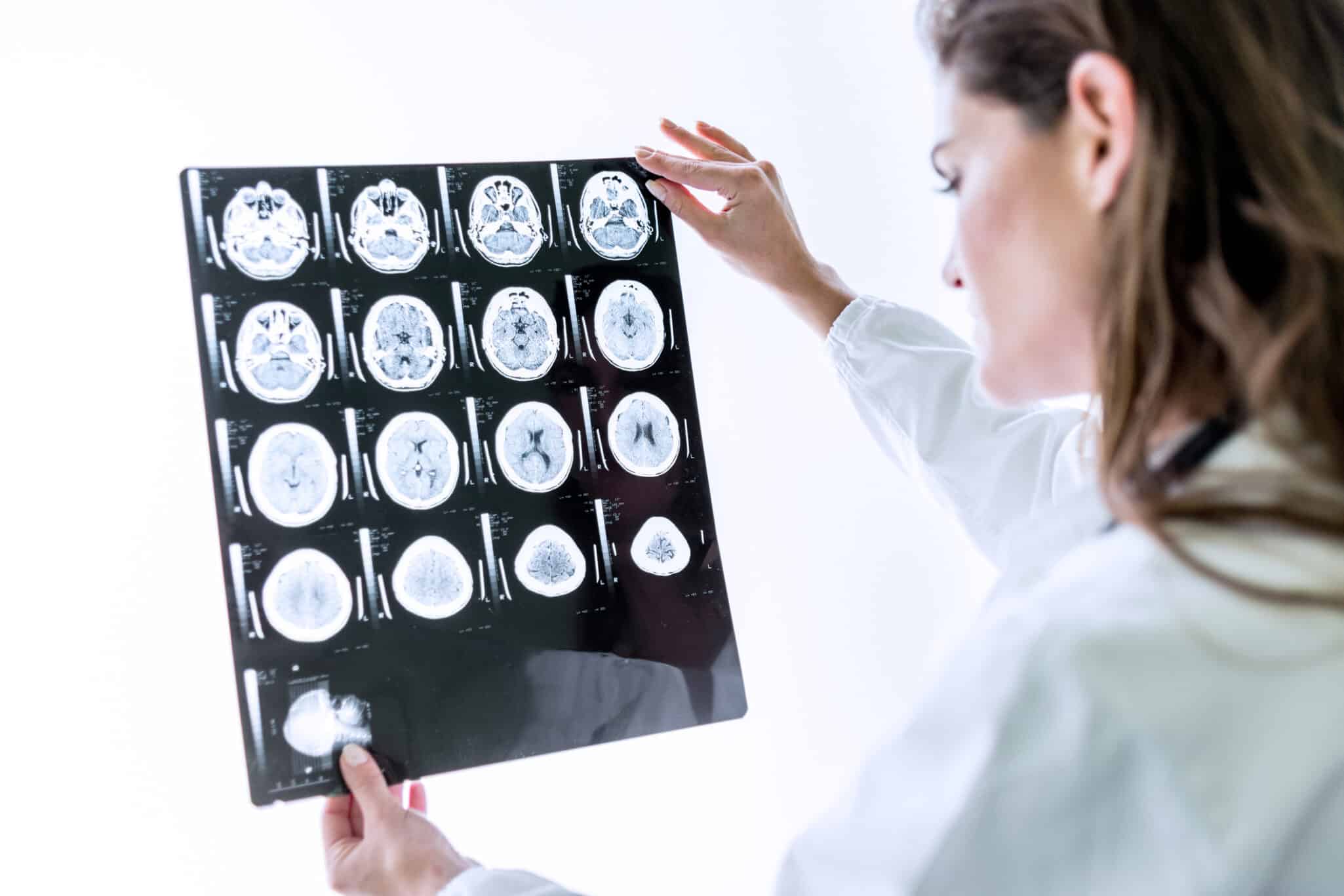Learn About Benign and Malignant Brain Tumors and Your Treatment Options
If you’ve been diagnosed with brain tumors or another neurological condition, you may understandably feel an overwhelming sense of fear. At Texas Neurosurgery, we know how intimidating a brain tumor can be, but we also know that there are several treatment options to explore. Our neurosurgeons strive to soothe your fear and help you to understand exactly what you’re facing.
What Types of Brain Tumors Are There?
Brain tumors are classified in two ways:
- Primary tumors are tumors that originate in the brain or the spinal canal.
- Secondary tumors are tumors that spread from other areas of the body to the brain or the spinal canal.
Approximately 25 percent of brain tumors are secondary, and a majority of these tumors are caused by lung cancer that has metastasized.
In turn, brain tumors are also classified as benign or malignant. They develop from different types of brain tissue and are often named after the areas in which they originate.
Benign tumors usually grow very slowly; malignant tumors often grow rapidly and are life-threatening. Although a primary malignant brain tumor is sometimes called “brain cancer,” it rarely spreads to other parts of the body (unlike most types of cancer). It can, however, spread within the brain and spinal cord. All secondary brain tumors are malignant.

Brain Tumor Treatment Options
The doctors at Texas Neurosurgery offer several treatment options for brain tumors. Which options are available to you will depend on the specifics of your situation.
Craniotomy
A craniotomy is a surgical procedure where part of the skull is temporarily removed to allow direct access to remove the tumor. We may recommend a craniotomy for larger tumors or tumors that are putting pressure on your brain. This method allows surgeons to remove as much of the tumor as possible. This method is also necessary for doctors to perform a detailed examination or when the tumor is in a less risky area for surgical access.
Recovery from a craniotomy typically involves a hospital stay of three to seven days. During this time, you may experience headaches, fatigue, and some weakness. After discharge, you’ll continue recovering at home with prescribed pain medications. Patients gradually resume normal activities while avoiding strenuous tasks until cleared by their surgeon.
Stereotactic Radio Surgery
Stereotactic radiosurgery (SRS) is a non-invasive procedure that uses targeted radiation to treat tumors without making any incisions. SRS is particularly suitable for patients with smaller, well-defined tumors or in areas of the brain that are difficult to reach surgically. It's also an excellent option for patients who aren’t candidates for traditional surgery or those who prefer a less invasive approach.
The treatment involves a few sessions, each lasting about an hour. Recovery from stereotactic radiosurgery is usually quick. Most patients can resume normal activities within a day or two. You may experience mild fatigue or headaches, but severe side effects are rare, and follow-up care is minimal.
Which Surgery Is Right for Me?

Choosing between SRS and craniotomy depends on several factors, including the size, location, and type of the tumor, as well as your overall health, age, and personal preferences. Your neurosurgeon will discuss each option's potential risks and benefits based on your specific condition to help you make an informed decision. In some cases, we may recommend a combination of both procedures to manage the tumor while minimizing risks.
Why Choose Texas Neurosurgery, LLP?
At Texas Neurosurgery, LLP, our board-certified neurosurgeons have over 20 years of experience providing exceptional care and expertise to their patients. Their extensive knowledge and skill in treating brain tumors means they deliver the highest quality treatment tailored to each individual's needs.
Our certified physician assistants support our neurosurgeons. From your first consultation to post-treatment follow-ups, our PAs provide compassionate care. They’ll answer your questions and guide you through each step of your treatment.
We aim to give every patient the personalized attention they deserve and the most effective treatment plan. We combine advanced medical expertise with genuine empathy and understanding. Texas Neurosurgery is here to make this process as smooth as possible, prioritizing your well-being and peace of mind.
Frequently Asked Questions
What Are the Symptoms of a Brain Tumor?
Brain tumor symptoms can vary depending on the tumor's type, size, and location but often include:
- Headaches: Persistent or worsening headaches, especially in the morning or when changing positions.
- Seizures: New or unexplained seizures.
- Nausea and Vomiting: Especially if unrelated to other known causes like a stomach virus.
- Vision Problems: Blurred or double vision, loss of peripheral vision.
- Balance Issues: Difficulty walking or maintaining balance.
- Cognitive Changes: Memory loss, confusion, difficulty concentrating, or noticeable changes in personality or behavior.
- Speech Difficulties: Trouble with speaking or understanding speech.
- Numbness or Weakness: Particularly on one side of the body.
- Fatigue: Persistent or unusual tiredness.
If you’re experiencing multiple symptoms like these, please contact Texas Neurosurgery.
What Should I Bring to My First Appointment?
For your initial appointment, bring any relevant medical records, previous imaging scans (such as MRI or CT scans), a list of current medications, and pertinent notes on your medical history. It's also helpful to have a list of questions you may have regarding your diagnosis and treatment options.
How Long Does Each Treatment Session Last, and How Many Sessions Might I Need?
A craniotomy usually takes several hours and may require follow-up surgery or additional treatments, depending on the complexity. Stereotactic radiosurgery (SRS) involves multiple short sessions, each lasting 30 to 60 minutes. Your number of sessions will depend on the tumor's size, type, and location.
Are There Any Lifestyle Changes I Should Make Before or After Treatment?
We may recommend avoiding strenuous activities and following dietary guidelines, especially after a craniotomy, to aid in your recovery. Before and after treatment, you should limit stress, maintain a healthy diet, and follow any specific restrictions related to physical activities or daily routines we provide.
What Is the Typical Recovery Time After Treatment?
A craniotomy generally requires 3 to 7 days in the hospital, with a gradual return to daily activities over several weeks. SRS has a much quicker recovery, typically allowing patients to resume normal activities within a day or two.
What Causes Brain Tumors?
While the exact causes of brain tumors aren't fully understood, several factors may lead to their development, including:
- Genetic Mutations: Changes in DNA can cause cells to grow uncontrollably, leading to tumor formation. Some inherited genetic conditions, like neurofibromatosis or Li-Fraumeni syndrome, increase the risk.
- Radiation Exposure: Exposure to ionizing radiation, such as previous radiation therapy to the head, can increase the risk of developing brain tumors.
- Family History: A family history of brain tumors may raise the likelihood of developing one, although this is relatively rare.
- Environmental Factors: Although not definitively proven, some studies suggest that exposure to chemicals or toxins might play a role.
- Immune System Disorders: People with weak immune systems, such as those with HIV/AIDS or who have had organ transplants, may have a higher risk.
Most brain tumors develop without a clear cause, and ongoing research continues to explore potential genetic, lifestyle, and environmental influences.
Expert Care for Brain Tumor Diagnosis and Treatment
If you or a loved one is experiencing concerning symptoms or have been diagnosed with a brain tumor, you’ll need to seek expert care right away. Our experienced team at Texas Neurosurgery, LLP, is ready to help in the greater North Texas area. Call us today at 214-823-2052 to schedule your first appointment.

